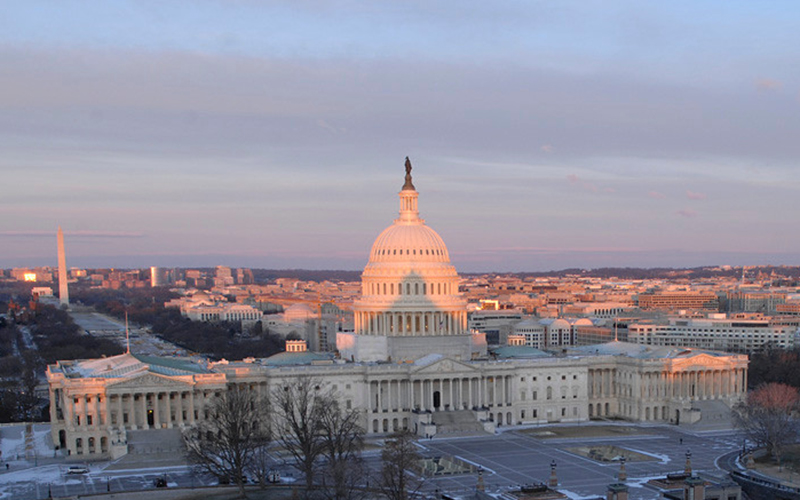
Capitol Hill will be relatively quiet for the next four weeks, as both the House and Senate are in recess in advance of the Nov. 6 elections. (Photo by Architect of the Capitol)
WASHINGTON – The Senate left for its October recess two weeks earlier than planned Thursday, following the lead of House members who went home early to dive into their re-election campaigns as contentious midterm elections loom.
The move did not surprise one political analyst, who said lawmakers are eager to spend time on the campaign trail. And it was welcomed by at least one Arizona lawmaker, who said Congress already finished a lot of its work and that it “cannot and should not be in perpetual session.”
But the early departure means Congress will have even less time to finish what work remains – including budget bills and renewing the Land and Water Conservation Fund – in the handful of work days currently scheduled for the rest of this year.
The Senate was originally scheduled to go on recess at the end of this month, but left Thursday after pushing through confirmations of two dozen judicial nominees, including new U.S. District Judge Susan Brnovich in Arizona.
Brnovich’s confirmation was welcomed by Sen. Jon Kyl, R-Arizona, who said she will help address a “judicial emergency” caused the by the heavy workload on the district court, which still has two vacancies.
The House had likewise been scheduled to leave on recess this weekend, but headed home two weeks ago.
Neither the House nor the Senate is scheduled to return to Washington until the week after the Nov. 6 elections. At that point, the House will have 16 days remaining this year, according to its current calendar, and the Senate will have 19.
Molly Reynolds, a fellow at Brookings Institution, said she was not surprised that lawmakers decided to take extra time off this year, with such high-stakes elections looming.
“In the House, where Republicans are concerned about their chances of remaining in the majority, the House majority leader and the speaker I think wanted to give their vulnerable incumbents as much time as possible to be on the campaign trail,” Reynolds said Friday.
“And in the Senate there is also an interest in spending time on the campaign trail, though on the Senate side there is much more focus on the Democrats,” she said.
When they return, lawmakers in the lame-duck Congress will likely be occupied by remaining appropriations bills for fiscal 2019, Reynolds said.
Other legislation hanging in the balance includes a bipartisan plan to revive the Land and Water Conservation Fund. That fund has directed billions of dollars in off-shore oil revenues over the past 50 years to state and federal governments for parks, recreation and land purchases.
The fund expired Oct. 1, but a surprise bipartisan agreement between leaders of the House Natural Resources Committee in late September sparked hopes for a reauthorization.
But nothing has happened to the bill since it passed out of committee, and some advocates worry that there will not be enough time now for the House and Senate to pass the measure.
Reynolds said the priority will likely be appropriations bills.
“Before the end of September, Congress actually completed a number of its appropriations bills, bills that fund discretionary federal programs, but there are a number that remain unfunded,” she said. “Congress will need to do something on those that affect other parts of the federal government to prevent a partial government shutdown.”
Despite the amount of work remaining for Congress, one Arizona official said lawmakers’ time is better spent back in their districts.
Rep. Paul Gosar, R-Prescott, said in a statement Friday that lawmakers have done the work they need to do – pointing to the earlier passage of tax cuts – and they need to be with their constituents around the midterm elections.
“Congress is made up of citizen legislators and Congress cannot and should not be in perpetual session,” Gosar said. “It is fundamentally important for members to be in the district.”
Connect with us on Facebook.